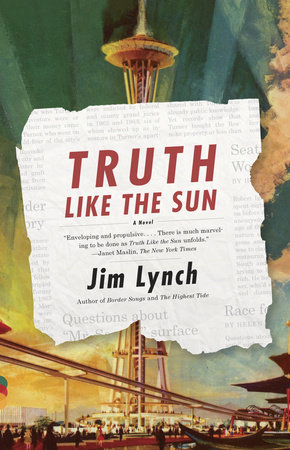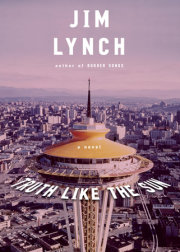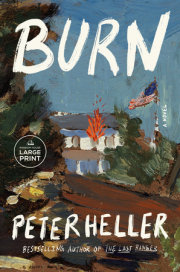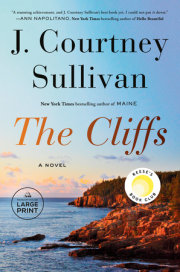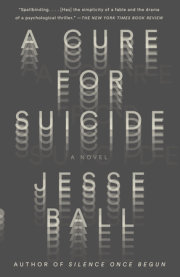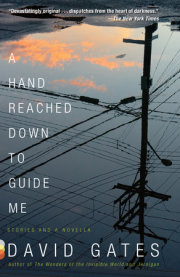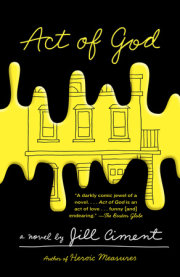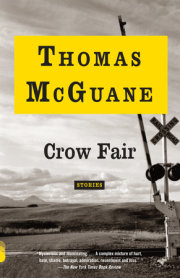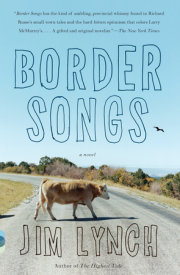Excerpted from Chapter OneChapter One
April 21, 1962THIS IS WHEN and where it begins, with all the dreamers champagne-drunk and stumbling on the head of the Needle. Look back further all you want, but this renaissance starts right here when the dreamers get everyone to take one long gawk at this place. Look! Just, just look at this brash metropolis surrounded by postcard summits and all that boat-loving water. Up here in the dark, five hundred feet above it all, downtown looks like it’s on fire again, though it’s just showing off this time, flaunting cheap hydropower, everyone flipping on their lights to greet the world, all those bulbs straining to make the city look bigger than it actually is. Taste that salty air. Smell the clam spit. Where better to start afresh? A whole new way of living in a city of things to come. That’s right. A city so short on history it’s mostly all future anyway. So climb on board and go, go, go!
The elevator doors glide open seven minutes before midnight, everyone spilling out, men dressed like penguins, women like peacocks, an older crowd, bloodshot and slack-jawed, up past bedtime, bumping into radiant waitresses in gold lamé passing out flutes of champagne. Roger Morgan, the grand exalted dreamer himself, grabs a glass, thanks the waitress, takes in the chaos. Dozens of people— and it sounds like hundreds—are already here, seeing their city for the first time from this height, shouting, crowding the windows, exclaiming Good God! at the spectacle of lights and water below while others marvel at how the dining area spins around the elevators and kitchen just slowly enough to make you think you’re losing your marbles. A busty woman returns from the bathroom and can’t find her friends, who’ve rotated eighty feet clockwise, until she hears them roaring at her confusion. A drink spills, a glass breaks, a man retches and blames it on the spinning. More shouts. More stampeding laughter.
Roger parts a gaggle, turning more heads—so damn young, isn’t he?—into another flurry of handshakes and hugs from people who’ve already embraced him tonight, but they want more contact now that they’re loaded and up in his Space Needle. Everybody wants his blessings, whether it’s the etiquette committee urging local ladies to wear dresses during the fair or the beautification committee telling school kids to keep those candy wrappers in their pockets. The fair’s coming! Clean the streets and shine your shoes. The fair is coming!
Roger continues grabbing shoulders and, depending on the recipient, offering one of his nimble smiles—gracious, mischievous, reassuring. Boyishly jug-eared, he comes off as a careful listener who agrees with you even while explaining why he doesn’t. Pushing words through his head now, he tries them out against this dizzy backdrop. Plan a toast all you want, but when the mood shifts you’d better adjust. “Every endeavor, big and small,” he whispers to himself, “begins with an idea.”
Where the hell is Teddy?
More overdressed drunks stumble out of the elevator into a fresh round of exclamations and squabbles over the exact whereabouts of various landmarks. Dapper men surround him. The only one he recognizes is Malcolm Turner, to whom he recently gave most of his savings. “Looks like the world’s your oyster,” a bullet-headed man tells him through a menacing smile. A camera flashes with each shake of his hand. Is that a Times photographer? It’s past midnight. Toasts were supposed to start already, but Roger knows when to stall. A meeting runs on schedule or tempers flicker, while a roast, a tribute or any boozy gathering moves to a slower beat. You wait until they’re itching for someone to make sense of it all, then you wait a bit longer.
He hears Linda’s laugh, gauging her inebriation by its volume: plastered. He’d considered her gregarious before she’d wheedled him into proposing. Since then, she’s struck him as loud, especially when she drinks. He finds his mother, as far away from his fiancée as she can get, telling a story about her childhood that he knows isn’t true.
He wraps an arm around her as if to brace her, though she’s probably the sturdiest woman up here, her sober regality as out of sync with this teetering mob as her fake British accent.
Teddy Severson finally strides over, tall, hipless and lipless. “You ready?”
The sound system squeaks before Teddy’s throaty voice comes through louder than necessary. “Thanks for joining us.” Reporters set their champagne aside and flip open notebooks as everybody packs into this curve of the dining area. “Thanks for joining us,” he repeats over the lingering chatter, “on the eve of something that most people didn’t think was possible.” Laughter ripples, glasses clink, the city sparkles, a cigarette smolders toward his wedding band. “Along the way, I heard from enough doubters and doomsayers to make me forget that all we were trying to do was throw a nifty fair, not ruin this city.” Laughter mixes with gossipy murmurs. Everyone knows this crowd holds more than its share of doomsayers. “I too miss the quiet Seattle of yesteryear,” he continues woodenly, reading now, “but we can’t keep this place in curls and a Buster Brown suit much longer.” He blushes, waiting out the polite chuckles. “This city has done amazing things. It rose from ashes, flattened hills, dug canals, bridged lakes and shipped its products to every major port. And for the next six months, it will, my friends, become the capital of the world.” He pauses, as if expecting more than golf claps. “But let me shut up and get Roger up here to christen this place up right, because without his gift of gab we wouldn’t be here, and we certainly couldn’t have coaxed thirty-five countries into helping us throw a fair in some city they still think rhymes with beetle.”
“Jus’ a few words,” Roger says to amuse those familiar with his rambling, noteless speeches. Easy to see in this light that he’s younger than everybody: loose-limbed, bushy-haired, dimpled. “First time I experienced this view,” he begins, “was when Teddy, Mr. Vierling and I rented a helicopter and hovered up here to see what it might be like to actually have a restaurant in the sky.” Roger makes helicopter noises, then mimics the pilot. “‘Four hundred, four-fifty, five hundred feet. Holding.’ Teddy kept muttering Jesus, while Mr. Vierling calculated aloud what it would cost to build this thing. The numbers, of course, kept going up, but it was obvious to all of us that this not only could happen, but needed to happen. So, what do you think? Pretty marvelous, huh?” Opening his arms, as if to hug everyone, he notices the county prosecutor, the city attorney, the police chief, two doomsaying councilmen and the head of Boeing all studying him. While cameras flash, it occurs to him that he still doesn’t know the full price of the deals he’s struck and the friends he’s made.
“I’ve been warned that frankly we’re not sophisticated enough to pull this thing off, that we have a champagne appetite and a beer budget. Well”—he hoists his glass—“I disagree.”
His gratitude rattles on for five minutes without notes, thanking architects, contractors and engineers by name. “All ambitious endeavors,” he says slowly now, “begin with a suggestion, a kiss, a daydream—whether it’s to build a freeway, a relationship or a world’s fair.” He lowers his eyes and waits out the murmurs. “This unique building was put up in four hundred and seven days. It can take longer than that to remodel your kitchen, yet it’s already well on its way to becoming one of the world’s most recognizable icons.” He pauses, letting the words prick the bastards who want to tear it down after the fair. “We even put a forty-foot flame on top of it. That’s right. We built the tallest building west of the Mississippi, slapped a spinning restaurant on top and lit the whole damn thing on fire. Sound smart?” He grins and shrugs. “I confess to having some moments of profound doubt. ‘What if this is the stupidest thing anybody’s ever tried?’ Look at us! Look at this audacity!” He steps back, inhales, then continues. “It’s amazing how many bad ideas we’ve had to overcome. Somebody suggested we fill Mount Rainier’s crater with oil and keep it burning through the fair. Another genius recommended that we tell NASA to land a rocket in Elliott Bay. Others offered conspiracy theories. The Committee Hoping for Extraterrestrial Encounters to Save the Earth—aptly nicknamed CHEESE— claims the Needle was designed to, and I quote, ‘send transmissions to beings in other solar systems.’ ” He cuts into the rising mirth. “Can I get a moment of silence here?” As the room settles, he takes everything in—the strange gleaming faces and lopsided chandeliers, the counterclockwise drift of the lights below, the bright-lipped brunette seemingly modeling ringless fingers for him. He waits a few more beats. “We are simultaneously at the end of something challenging and magnificent and at the beginning of something challenging and magnificent. So let’s commit this moment to memory, okay? Look around. Remember what our city looked like on this night from up here. Remember how young we all were.” He leans back to milk the laughter. “Remember this moment,” he insists, “before the eyes of the world take a good long look at us.”
ANOTHER WHIRLWIND of good-night hugs and handshakes. Roger takes his time on each one, matching each grip and embrace with his oversize hands. He’s great with good-byes, having noticed long ago that most people aren’t.
Soon it’s down to just him and Teddy staring at the moonlit silhouette of the Olympic range with dishes clanking behind them in the kitchen. Teddy coughs, clears his throat and frisks himself until he finds a pack of Chesterfields. He taps one out, flips open a lighter, spins the wheel, watches the flame, hesitates, then shuts it and slides the cigarette back into its pack.
“Been thinking,” he ruminates, dragging a palm through his graying hair. “When you really look closely, you realize that just about every goddamn thing begins with a kiss.”
“Screw you.” Roger chuckles. “But you know what?”
“What’s that?”
“Seriously, all BS aside.”
“Yeah.”
“Seeing how at least one of us needs to keep our mind on what matters?”
“Right.”
“Well, what I’ve been thinking—”
“Uh-huh.”
“—is how we can’t keep this city in short pants any longer. Know what I mean?”
Teddy taps a cigarette back out and lights it. “Go to hell.”
Roger waits for whatever’s coming, knowing his friend often turns serious when he drinks. Starts out sarcastic, goes philosophical, grave, then personal.
“You know I still get people asking me about you.” Teddy mimics voices: “ ‘What’s his story? Where’d he come from? How’d you let a youngster run things?’”
“Don’t they read the papers?”
“What do they ever say other than the obvious? Rising star in the restaurant biz who drew the Needle on a napkin, blah, blah, blah.”
“So, what do you tell ’em?”
“That you came here on a spaceship from some planet where they’re a whole lot smarter than we are.”
“C’mon.”
“I tell ’em your age doesn’t matter, that you can’t be outworked, that you could sell snow to Eskimos and you don’t need any sleep. Sometimes I just tell ’em you’re the future, or the city’s good luck charm, or that Jackie V. swore by you. Basically, I encourage ’em all to go directly to hell. Don’t pass Go. Don’t collect two hundred dollars.”
Roger watches tiny red taillights crawling up Capitol Hill.
“Know something, though,” Teddy says on the inhale. “Been meaning to tell you this: enough is never enough with you. And it’s not healthy. It’s like an addiction.”
“To what?”
“To more.” Smoke flares out his nostrils. “You can’t get enough of anything.”
Roger rubs his cheeks and averts his eyes, wondering if it’s that obvious he’s increasingly driven half-mad by the limitations of having only one life. All the things he’ll never see or do or understand. All the people he’ll never know. “Whatever you say,” he finally says.
“Think about it.”
Roger squints in mock contemplation.
“Hell with ya.” Teddy straightens the jacket over his bony shoulders. “But tell me, how do you win over people so quickly?”
Roger smiles slowly. “By finding out what they want.”
“Ahhh. Like a good waiter.”
“Not really.”
“Because you don’t always give it to ’em.”
“Right, but at least I know what it is.”
Teddy snickers. “Gonna grab a few hours of shut-eye, so I can function in the morning.” He snubs the half-smoked Chesterfield on the heel of his dress shoe, sets it on the table, smoldering end up. “You should too, but you won’t because how else will people possibly find the fair if you’re not sitting up here guiding them in?”
“Teddy?”
“Yeah?”
“We ready?”
He sighs. “By the time we’re ready it’ll be over. You really gonna stay up here till morning?”
“Maybe.”
Teddy shakes his head and wobbles off in a pigeon-toed shuffle. “Remember,” he shouts without looking back, “there won’t be anybody to work the elevator till eight or so.”
“Thanks for what you said tonight,” Roger says, “even if I don’t deserve it.”
Teddy waves it off. “I lie about all sorts of things, but not about you.”
Copyright © 2013 by Jim Lynch. All rights reserved. No part of this excerpt may be reproduced or reprinted without permission in writing from the publisher.

